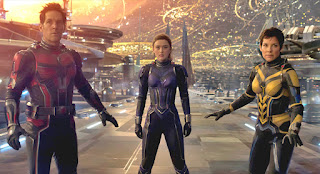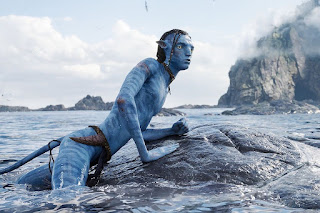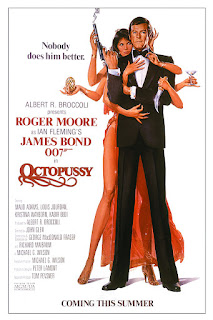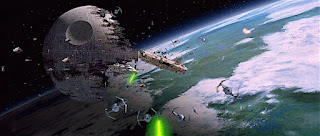Whether it be in the Marvel Universe of the 616 or that of the MCU's Earth-199999, Uatu of The Watchers is a figure that sees all, knows all and perceives all concerning the various branching realities that lead to consequences both good and bad. While we can't have Uatu's clarity of vision, we can still play armchair Watchers ourselves and try and divine the possible paths ahead for the MCU.

With the Phase 5 releases of Ant-Man & the Wasp: Quantumania and Guardians of the Galaxy Vol. 3 not performing at or above the out sized expectations set by some previous MCU releases, the cries of "superhero fatigue," which have been heard since the early '00s, are once again being thrown around in the same old kneejerk fashion. To that, let's say first that anyone who would think that the MCU needed to or feasibly could sustain the same momentum of the Infinity War/Endgame era in order to prove its viability is not a serious commentator on pop culture trends. You can handily disregard any box office pundit who expresses faux concern at the fact that a cinematic universe now in its fifteenth year and that currently encompasses thirty two films along with eight television series (far more than that if you consider series like Agents of S.H.I.E.L.D., Agent Carter and the Netflix shows to be in MCU continuity) and two Special Presentations is going to experience peaks and valleys of viewer interest.

Yes, Avengers: Endgame represented a peak for the MCU. But getting to that point was the result of eleven years of build-up over the course of twenty one films. In a pop culture world where fads and trends quickly go in and out of fashion, the fact that the MCU was able to hold the level of engagement it did for as long as it did is extraordinary. To try and keep the audience's interest at that same peak level would be impossible. While hardcore fans will continue to stay engaged, a segment of the broader audience is naturally going to step back a bit. They're either going to get off the train altogether for a time or they're just going to become more selective about what specific aspects of the MCU still excite them. The MCU can continue to be massively successful for awhile without matching the high of Endgame.

This is a cycle that the comics have experienced for decades, the ebb and flow of sales in relation to big events and reboots and so on. Some readers who have ditched comics for a time will jump back on board when some line wide event happens that calls upon the shared might of the Marvel universe to rally against an opponent of singular power. Or when a superhero team gets a spiffy new line-up, or when a hero gets a new costume or a power upgrade or a new #1 issue looks like an appealing point of re-entry. This is the dynamics that we're going to see mirrored in the MCU going forward. It's going to experience ebbs and flows of interest. And that's ok. It shouldn't be treated as a case of the sky falling when a new MCU movie doesn't break box office records.

We might be at a point where every new MCU release isn't necessarily going to drive the same stampede to the theater but that said, it's also clear that there's a level of hardcore interest that remains locked in and, as the Multiverse Saga continues, it's just going to be a matter of getting the broader audience back on board for the bigger swings. Some might choose to sit out this movie or that in the post Endgame era but, just as with the comic crowd who might wait for an event to draw them back in, if these lapsed viewers see something that piques their interest, they'll have a renewed itch to check out what's new in the MCU.

The biggest issue Kevin Feige is going to have to contend with going forward in regards to keeping a wider audience hooked is determining how much having a shared universe is both a selling point and a hindrance. Prior to Phase 4, there was a linear simplicity to following the MCU. It was one film and then another, one building block on top of the other, and the trajectory of each Phase was simple for a mainstream audience to understand.
Phase 1 built up to the forming of The Avengrers and then Phases 2 and 3 were about the emerging threat of Thanos, the search for the Infinity Stones and the ramp up to Infinity War. It's with Phase 4 that things became much more complicated, to the delight of many fans but to the frustration of casual viewers who haven't been able to easily wrap their heads around Where It's All Going.

Adding to that sense of complication and confusion is the fact that now there are a multitude of TV shows and specials that inform the movies and vice versa. If following the movies was becoming a hardship for some viewers, the addition of the Disney+ shows has made it feel impossible. It didn't help that due to the delays caused by the pandemic, Phase 4 crammed seven movies, eight shows and two specials into two years. That's a lot. For fans, it's a feast. For less dedicated viewers, I think it's been overwhelming and off-putting - especially when it's difficult for them to determine what the road map ahead is.
Comic fans naturally have a better sense of where concepts like "incursions" are going to lead as the Multiverse Saga continues but for non-nerd viewers, watching a lot of the Phase 4 and 5 content likely feels like running into a wall of gobbledygook. Fair enough, I suppose, even though there's really no more gobbledygook at play here than there was during the Infinity Saga.
Once all the pieces start to fall into place, confusion will surely give way to a sense of "oh, so that's where all this was going" as the big picture emerges (Yes, we'll get back to dealing with that Celestial sticking out of the Indian Ocean. No, the matter of Doctor Strange's third eye hasn't been so easily resolved.) but we're not there just yet.
Being a shared universe has been the MCU's defining characteristic. It's the quality that other studios have tried (and largely failed) to emulate. But as we pass the fifteenth anniversary of the MCU, the question is at what point does a universe that encompasses as much material as the MCU does become too daunting for some viewers? Its interconnectivity has been the MCU's strength but will it turn into a liability? At what point does the MCU's continuity represent too big of a buy in?

When you look at the massive success of recent films like Top Gun: Maverick, Avatar: Way of the Water, and Super Mario Bros., it's easy to see there's a hunger among audiences for sharply made pop entertainment that requires minimal investment in a larger world. No one had to brush up on their Top Gun or Avatar knowledge to enjoy their sequels and even if they had, we're talking about one movie to get up to speed, not a couple of dozen or more. If there's one major factor in any downturn of audience interest in the MCU, it's likely the perception that it requires more attention than many viewers are willing to keep giving it.

Whether the MCU actually requires that much attention, however, is debatable. I think, as with the comics, it's easy to pick and choose what interests you. No comic fan reads every comic that Marvel publishes every month and yet it's not a cause for confusion on the part of readers. You can focus on whatever characters that appeal to you and not need to know the details of every other narrative, or be familiar with every corner of the 616. Same with the MCU. You don't have to follow it all to enjoy whatever you do choose to check out. That said, it is true that the movies are now serving not just as sequels to previous films but they're also serving as continuations of the TV shows. Doctor Strange in the Multiverse of Madness isn't just a follow up to the first Doctor Strange, it's also a follow-up to Strange's appearances in Infinity War and Endgame and on top of that it's also a sequel to Wandavision. Similarly, this November's The Marvels isn't just a sequel to Captain Marvel but it's also a continuation of Monica Rambeau's story from Wandavision and Kamala Khan's from Ms. Marvel. It's hard to make a case that the MCU is new viewer friendly when in most cases it relies on the audience having made an investment in these characters across both film and TV. For MCU fans, this is an enticement not a deterrent but at the same time it's hard not to sympathize with the casual viewer that just wants to give two hours or so of their time to a movie and not have to be caught up on maybe twenty hours of material before hitting the theater on a Friday night.

It's going to be interesting to see how Kevin Feige deals with this issue as time goes on. Clearly there is a commitment to keeping the present continuity going through Avengers: Secret Wars at least. The Multiverse Saga is well in progress and I don't think anything, box office wise, is going get that off track. The MCU is still racking up hits post Endgame. In some cases, some of their biggest to date so the path through Phase 5 and 6 seems safe. But after that, what then? Avengers: Secret Wars will be the fortieth MCU movie by that point. That's mind boggling to consider. It used to be that for a movie series to go past four or five entries was a sign that it was probably getting long in the tooth. The Fast & Furious franchise is going to be wrapping things up with its tenth and eleventh installments. So to think about the MCU at forty interconnected movies plus however many TV series by then, you have to wonder: at what point does doing a reset become a necessary move?

In the comics, the 616 has continued unbroken since its inception and will likely continue as such on into eternity. That's a key to its success, the commitment to one ever-expanding narrative in which continuity matters (even if it has to be occasionally fudged). But comics are a very different medium than film. With characters made of pencil and ink, they can remain at their ideal age forever, can die if the story demands (only to return renewed and refreshed!) and so the task of keeping that universe intact is much easier. Movies are totally different. Actors age, they move on to other projects, and the movie going audience also shifts in ways that make maintaining a single continuity and having the audience stay invested in it over the course of ten, twenty years or more much more difficult. When Secret Wars comes out, if it stays on schedule, not only will it be the fortieth MCU film, but by 2026 we'll be getting very close to the 20th anniversary of the MCU itself.

You can say that, well, Star Wars is well past forty years already and fans are still invested in that universe but it's also true that there's much less of a buy in to Star Wars. You've got three trilogies and two side films at this point. So, a mere eleven movies since '77. In contrast, there's been nine MCU films just since 2021. And yeah, you could point to the many Star Wars shows that have emerged over the past few years and the animated ones that have been popular as well but I don't think most audiences look at most of the SW material that exists beyond the movies as being essential to their ability to enjoy a new movie.

Then you have long running franchises like Bond and Godzilla but in both those cases, even though these franchises go back to the fifties and sixties, there's no obstacle to just jumping on board with a new entry. There's been 37 Godzilla movies to date (with a new one from Toho due this year) and 27 Bond films (if you count 1967's Casino Royale and 1983's Never Say Never Say Never Again) but with minimal continuity between them. All you need to be up to speed on going in is that Bond is a secret agent and Godzilla is a giant lizard. That's it. Now imagine if the Godzilla series had been telling one long narrative since 1954. On the one hand, I say that'd be pretty cool. On the other, it would have required an insane amount of coordination over the years on the part of studios and filmmakers as well as an uncommon level of commitment on the part of the audience. That we'll still have MCU movies in another twenty or thirty years seems certain to me. The question is whether they'll still be telling one big interconnected story by then.

What I'm wondering in regards to the MCU is whether Secret Wars will be used as a reset point for the universe. In the comics, the Jonathan Hickman 2015 Secret Wars series saw the 616 destroyed and reformed. If the movie follows suit, it would be the perfect opportunity to start over while still preserving the previous continuity. Whatever new Marvel U that emerges in the wake of Secret Wars could acknowledge the existence of the previous one and retain certain aspects of it while also allowing for a square one reset. There could be a new Tony Stark, a new Steve Rogers, a new T'Challa even. The opportunity to start anew could also allow for the X-Men to be a part of the new MCU from the start. It could also allow for a young Peter Parker to be there from the beginning as opposed to joining midway in. That aspect could be tricky as we don't know what path the new set of Spidey films will be taking and how tightly they'll line up with the MCU. I don't think Sony or Marvel has any desire to shuffle Tom Holland off the stage too quickly but at the same time a reset would be the perfect time for a recast.

Whether any of this will happen is anyone's guess, of course. This is nothing but pure fan speculation on my part but I have to imagine that Kevin Feige is thinking along these lines. At the very least, he's got to be considering all the options of how to maintain a shared universe while still making it accessible to a wider audience that can't help but become a bit indifferent to it as it grows past the point where it's easy for casual viewers to follow.

It's possible that overcoming that obstacle might not require a reset at all. While a reboot could be on the horizon, I truly feel like we've just seen the tip of the iceberg when it comes to the ongoing MCU narrative. I mean, the scope of Secret Wars is going to be so massive it will dwarf Infinity War/Endgame. I would be surprised if Secret Wars wasn't a two part film with the first film ending not with half the population of the universe turning to dust but the whole damn multiverse itself fading into oblivion (although I admit that this might be a beat too similar to Infinity War to go with) and the universe not being restored until Part 2.

If they follow Hickman's Secret Wars from the comics, between the two films, we could have a whole run of movies and shows that take place in a "Battleworld" that encompasses many different regions that reflect the various aspects and genres of the Marvel universe, from sword and sorcery to Westerns to magic to mutants to high technology. Upon a reassembling of the MCU, if the previous continuity remains intact, there's so much that's been laid down that is still there to follow up on.

We could eventually have the Defenders on the big screen, Marvel's contentious, oddball answer to The Avengers, compromised of Hulk, Namor, Silver Surfer, Doctor Strange and Valkyrie. And if there's a Defenders, it's inevitable that we'll have an old school Avengers/Defenders War. There's also the potential still there for a World War Hulk movie (even more so should Harrison Ford's Thunderbolt Ross become Red Hulk). And with Kate Bishop, Kamala Khan, America Chavez, Cassie Lang, Billy Kaplan and Riri Williams all in place there's a Young Avengers team and/or Champions team ready to go. There's also a street level aspect to the MCU that has barely been touched on that could possibly be the focus of the next Spider-Man film if the likes of Daredevil, Punisher and Jessica Jones get involved. And we haven't even gotten to the Fantastic Four or the X-Men yet. Both of which represent huge entire universes unto themselves.

In addition to all that, I think it's inevitable that once the X-Men are established, that an Avengers vs. X-Men movie will be in the cards. How could they not go with that? You think Endgame was big? Please. An AvX movie would handily crush it. It'd make Civil War look like a playground squabble.

People can talk about superhero fatigue all they want but the fact of the matter is, the MCU isn't going anyplace. Whether or not there will be some course correction here and there, the idea that the MCU might end is ridiculous. Warners has been floundering with their DC universe for over ten years now with no talk of throwing in the towel, despite all the mixed results. So if anyone thinks that failing to break box office records with each new release, while still being successful, is going to lead to Disney and Marvel giving up on the MCU, that person is nuts. I'm telling you now, strap in for years and years more of the MCU. The option for individual viewers to get off the ride is always there but people shouldn't confuse whatever personal apathy they might feel with the reality that the MCU is not going anywhere. It will be up to Kevin Feige and his creative collaborators to make the shared universe aspect of the MCU feel like an asset rather than an albatross if they choose not to ever hit the reset button but I expect everyone involved will be more than up for that challenge.

If anything, I think it's fair to say that in another ten years or so we might look back at this era as the point when the MCU was just getting started.





















































